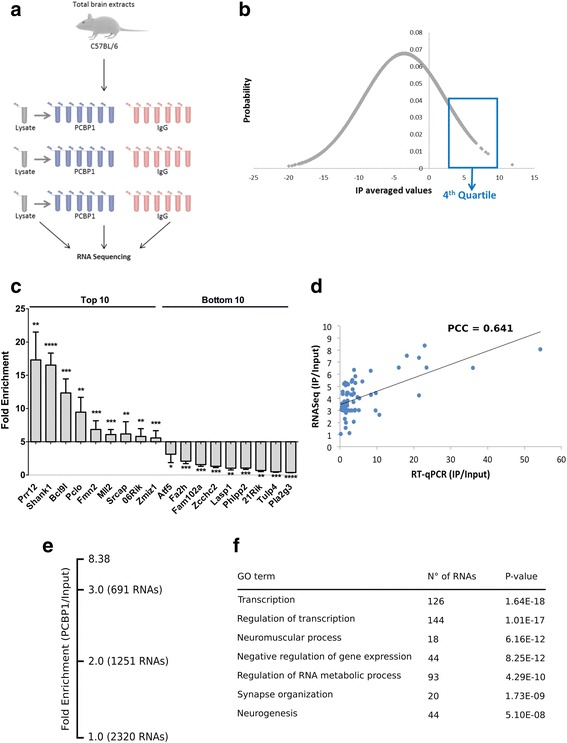Fig. 4.

Identification and validation of PCBP1 mRNA targets in mouse brain. a Overview of the biochemical procedure to isolate endogenous PCBP1 and identify its mRNA targets. Normal goat IgG was taken along as a negative control. RNA immunoprecipitation experiments were performed in triplo, with three different C57Bl/6 mouse brains, in order to rule out biological variation. b Data originating from RNA sequencing were normalized to the expression level of genes identified in the total brain lysates and to the negative control, IgG. The 4th quartile (top 25%) of the identified genes was selected for the validation of the performed data analysis. c Ten top and bottom genes of the 4th quartile selected from the total pool of identified mRNA targets were validated by RNA immunoprecipitation and RT-qPCR, showing the same trend in expression levels as seen in the RIP sequencing data. Data were normalized by subtracting the input values from the IP and IgG values. Afterwards these values were corrected for the amplification efficiencies (AE) of the selected genes; AE^[−(IP-input)] and AE^[−(IgG-input)]. Normalized and corrected IP values are shown in the graph. Multiple t-test with Holm-Sidak as a correction for multiple comparisons was used to test for the enrichment targets in the IP versus IgG. d Correlation of identified mRNA targets obtained by RNA sequencing versus RT-qPCR. Data values originating from RIP sequencing and RIP followed by RT-qPCR were normalized to their input values (IP/Input). Each point represents an individual mRNA, which was quantified using both methods. PCC = Pearson’s correlation coefficient. e Overview of the number of identified mRNA targets ≥ 2-fold (PCBP1/Input). Note that the fold enrichment values in the graph are presented in log2 scale while the values discussed in the text are in linear scale. f Selected GO term enrichments observed for PCBP1-associated mRNAs. RNAs enriched ≥ 2-fold (PCBP1/Input) were used
